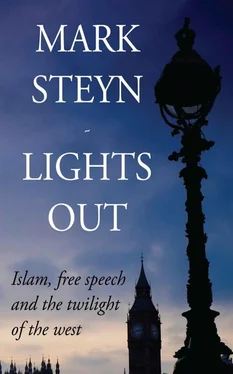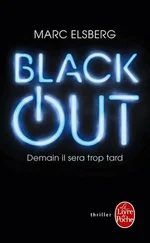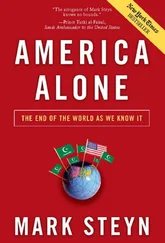SUBTERRANEAN CONVERSATION
Alarums
Maclean’s, February 18th 2008
SINCE MACLEAN’S got into a spot of bother with Canada’s “human rights” pseudo-courts, I’ve been pleasantly surprised by the number of our media confrères who don’t think it should be a “crime” for magazines to publish excerpts from books by yours truly. Nevertheless, it has to be said that not all my defenders are as full-throated as one might wish. “Mark Steyn’s book about Muslim demographics may contain some cynical statistics and Islamic stereotypes,” wrote Peter Jackson in The Telegram of St John’s, Newfoundland, “but his observations are not totally without merit.”
“Not totally without merit”, eh? That’s not exactly what Broadway producers call a money quote. I prefer Kathy Shaidle’s approach: “If your response to the Maclean’s /Steyn case isn’t tainted with outrage, sarcasm and a profound sense of urgency, there is something wrong with you,” she wrote. “I’m getting as worried by these prissy attitudes emerging around this case as I am about the case itself.” She’s right. I don’t mind the mass mailings of dreary identical insert-name-of-outraged-reader-here form letters run off by the Supreme Islamic Council of Moose Jaw or some other cockamamie pressure group, but a certain recurring shtick in the mainstream commentary is even more wearisome. In defending free speech in general, journalists usually feel obliged to deplore my exercise of it in particular:
Maclean’s published an alarmist screed by Mr Steyn… ( The Economist )
While the book may be alarmist… ( CFRB )
Steyn’s argument is indeed alarmist… ( The Guardian )
And, oh dear, even:
The fear of ‘a Muslim tide’ was alarmist… (Tarek Fatah and Farzana Hassan in Maclean’s )
Okay, enough already. I get the picture: Alarmist, alarmist, alarmist. My book’s thesis – that most of the western world is on course to become at least semi-Islamic in its political and cultural disposition within a very short time – is “alarmist”.
The question then arises: Fair enough, guys, what would it take to alarm you? The other day, in a characteristically clotted speech followed by a rather more careless BBC interview, the Archbishop of Canterbury said that it was dangerous to have one law for everyone and that the introduction of sharia – Islamic law – to the United Kingdom was “inevitable”. No alarm bells going off yet? Can’t say I blame you. After all, de facto creeping sharia is well established in the western world. Last week, the British and Ontario governments confirmed within days of each other that thousands of polygamous men in their jurisdictions receive welfare payments for each of their wives. Still no alarm bells? I see British Muslim nurses in public hospitals riddled with C difficile are refusing to comply with hygiene procedures on the grounds that scrubbing requires them to bare their arms, which is unIslamic. Would it be alarmist to bring that up – say, the day before your operation?
Sharia in Britain? Taxpayer-subsidised polygamy in Toronto? Yawn. Nothing to see here. True, if you’d suggested such things on September 10th 2001, most Britons and Canadians would have said you were nuts. But a few years on and it doesn’t seem such a big deal, and nor will the next concession, and the one after that. It’s hard to deliver a wake-up call for a civilization so determined to smother the alarm clock in the soft fluffy pillow of multiculturalism and sleep in for another ten years. The folks who call my book “alarmist” accept that the western world is growing more Muslim (Canada’s Muslim population has doubled in the last ten years), but they deny that this population trend has any significant societal consequences.
Sharia mortgages? Sure.
Polygamy? Whatever.
Honour killings? Well, okay, but only a few.
The assumption that you can hop on the Sharia Express and just ride a couple of stops is one almighty leap of faith. More to the point, who are you relying on to “hold the line”? Influential figures like the Archbishop of Canterbury? The bureaucrats at Ontario Social Services? The western world is not run by fellows noted for their line-holding: Look at what they’re conceding now and then try to figure out what they’ll be conceding in five years’ time.
The other night at dinner, I found myself sitting next to a Middle Eastern Muslim lady of a certain age. And the conversation went as it often does when you’re with Muslim women who were at college in the Sixties, Seventies or Eighties. In this case, my dining companion had just been at a conference on “women’s issues”, of which there are many in the Muslim world, and she was struck by the phrase used by the “moderate Muslim” chair of the meeting: “authentic women” – by which she meant women wearing hijabs. And my friend pointed out that when she and her unveiled pals had been in their twenties they were the “authentic women”: The covering routine was for old village biddies, the Islamic equivalent of gnarled Russian babushkas. It would never have occurred to her that the assumptions of her generation would prove to be off by 180 degrees – that in middle age she would see young Muslim women wearing a garb largely alien to their tradition not just in the Middle East but in Brussels and London and Montreal. If you had said to her in 1968 that westernized Muslim women working in British hospitals in the early 21st century would reject modern hygiene because it required them to bare their arms, she would have scoffed with the certainty of one who assumes that history moves in only one direction.
In another of those non-alarmist nothing-to-see-here stories, a British government minister tentatively raised the matter of severe birth defects among the children of Pakistani Muslims. Some 57 per cent of Pakistani Britons are married to their first cousins, and this places their progeny at increased risk of certain health problems. This is the only way a culturally relativist west can even raise some of these topics: Nothing against cousin marriage, old boy, but it puts a bit of a strain on the old health care budget. Likewise, it’s not the polygamy, it’s the four welfare cheques you’re collecting for it.
But this is being penny-wise and pound-blasé. What does it mean when 57 per cent of Pakistani Britons are married to first cousins and 70 per cent are married to relatives? At the very least, it tells you that this community is strongly resistant to traditional immigrant assimilation patterns. Of course, in any society, certain groups are self-segregating – the Amish, the Mennonites and whatnot. But when that group is not merely a curiosity on the fringe of the map but the principal source of population growth in all your major cities, the challenge posed by that self-segregation is of a different order. There are now towns in northern England where cousin marriage is the norm: Pakistanis aren’t assimilating with “the host community”; the host community has assimilated with Pakistan. Again, if you had told a Yorkshireman in 1970 that by the early 21st century it would be entirely normal for half the kindergarten class to be the children of first cousins, he would have found it preposterous.
But it happened. By “alarmist”, The Economist and co really mean “raising the subject”. Last year, the British novelist Martin Amis raised the subject of my book with Tony Blair and asked him if, when he got together with his fellow prime ministers, the Continental demographic picture was part of the “European conversation”. Mr Blair replied, with disarming honesty, “It’s a subterranean conversation.”
Читать дальше












